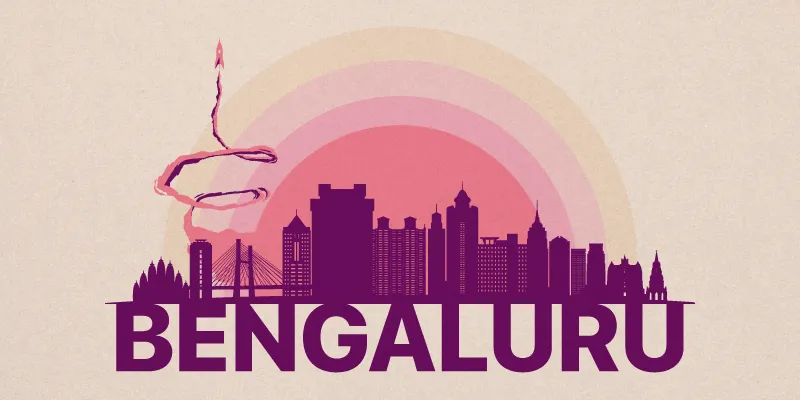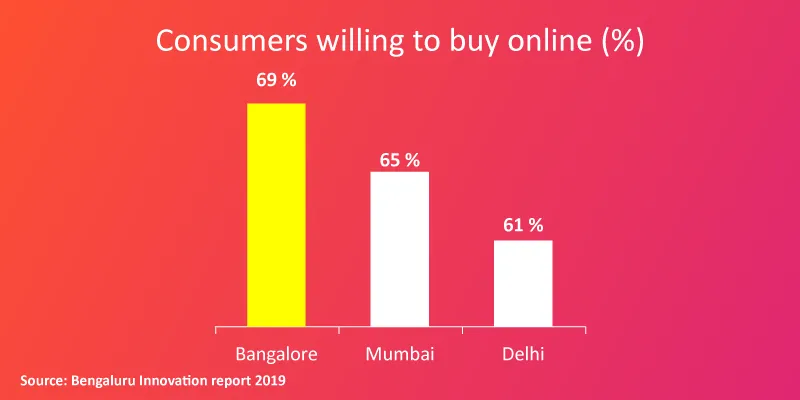Why Bengaluru has been an early adopter of innovations from the internet economy
According to Bengaluru Innovation Report 2019, the Silicon Valley of India has always been at the forefront of embracing startups, as the cosmopolitan culture makes the city an ideal location to test anything new from the internet economy.
Bengaluru was the first city in Asia to have installed electricity powered streetlights way back in 1905. More than a hundred years later, the city remains at the forefront of experimentation and adoption of new technology innovations, especially in the current dynamic world of internet economy.
Bengaluru Innovation Report 2019, a joint study by leading institutional investors Accel, , Ideaspring Capital, and the Government of Karnataka, highlights how the city has been receptive to new ideas, especially those that are technology-driven.
Regarded as the Silicon Valley of India, Bengaluru has been a breeding ground for innovation as its people have always been curious to try out new things, especially when it is related to technology. It also thrives as a testing ground for innovation before making a larger splash nationally or even globally.

As the startup capital of the country, Bengaluru is home to a significant number of dynamic internet economy companies like , , Amazon, , and , and the trend continues with the emergence of new startups.
Bengaluru has been a hotbed for technology and innovation, be it in the form of public sector units or educational institutes like the Indian Institute of Science, and several pioneering IT companies like Infosys. All this culminated in the explosive growth of information technology industry in the city, which laid the foundation for the new internet economy.
Ramana Reddy, Additional Chief Secretary, Department of IT, BT and S&T, Government of Karnataka, says in the report, “Karnataka is known for its IT power, which contributes more than $50 billion in software exports, making Bengaluru the fourth largest technology cluster in the world. The city has more than two million IT professionals– almost 16 percent of the total population. These strengths have enabled the city to truly transform from a technology hub to a startup capital and now a global innovation hub.”
Cosmopolitan atmosphere
Hosting people from diverse backgrounds, Bengaluru’s cosmopolitan atmosphere has rendered it an ideal place to test out technology.
According to the Innovation report, Bengaluru had the highest preference for online shopping, followed by Mumbai and Delhi, with 69 percent of people surveyed from Bengaluru willing to buy daily routine products online.
In the report, Bhavish Aggarwal, Co-founder and CEO, Ola, says, “Bengaluru is the youngest city, and everybody is a techie. The adoption rate is much faster. So, if one really wants to test their product at scale, there is no better place than Bengaluru. It’s a great test market for any technology.”

In the last decade or so, Bengaluru has been at the forefront of trying out new technology innovations of the internet economy. Flipkart, India’s leading ecommerce marketplace, now owned by Walmart, had started its operations in Bengaluru and this led to many other players to jump on the bandwagon. In a similar vein was the birthing of Ola’s ride-hailing services, which was followed by .
However, the biggest disruption for the startup ecosystem has come in the form of unified payments interface (UPI). Part of IndiaStack, the major work on this technology framework was done out of Bengaluru. In fact, 38.1 percent of all UPI transactions in Tier I cities in India or 24 percent of all UPI transactions in India originated from Bengaluru as of October, 2019.
Beyond ecommerce and digital wallets
If online financial transactions, ecommerce, and ridesharing are some of the innovations of which Bengaluru has been the early adopter, other innovative ideas too have found value in the city. Take the example of bike-sharing. This service, which was launched by , sees the yellow-tinted two-wheelers zipping across the city. Competition comes in the form of Ola-owned Vogo.
Foodtech is not far behind either.
Vivek Sunder, Chief Operating Officer, Swiggy, states, “As one of India’s best-known consumer tech startups, it was a natural decision for us to be based in Bengaluru because of the tech-savvy and cosmopolitan residents of the city, who are both discerning and early adopter customers for any innovative products that are launched.”
A similar sentiment is echoed by players like , , or , who provide delivery of fruits, vegetables, and groceries.
Bengaluru embraced digital payments as soon as the demonetisation drive kicked in. It is easy to find even small shops and autorickshaw drivers offering digital payment options using QR code technology. This clearly exhibits the continued trend of the city being an early adopter of tech innovations.
March to continue
The city of Bengaluru will continue to embrace new innovations coming from its vibrant startup community. This vibrancy is also equally being supported by the other players in the ecosystem which include the multinational technology companies that have deep roots in the city.
In fact, the mix of Indian technology companies and their foreign counterparts has brought forth a constant stream of innovations and has led to nurturing talent and people who are open to new ideas.
Prashant Prakash, partner, Accel, says in the report,
“Bengaluru has served as India's technology capital for over three decades now. With a robust heritage of premier R&D laboratories, academic institutions, and public sector focused firms, Bengaluru was the pivotal city that led to India's IT leadership in the world. These IT companies helped put India on the global map as the software industry permeated every sphere of business. Today, three of the top five and five of the top ten global IT companies are Indian. Indeed, ‘Bangalored’ has become a verb to describe the impact of the concentration of highly skilled people that serve global markets.”

Given the momentum within the city of Bengaluru in adopting new innovations, the pace is unlikely to slow down in the coming years. In fact, the internet economy is on the cusp of something even bigger as digital gains a more permanent foothold.
Siddarth Pai, Managing Partner, 3one4 Capital, adds, “Bengaluru has created a strong culture of technology-driven innovation - from HAL and BEL in the 1960s, to Infosys and Wipro in the 1990s to the startups and unicorns of today. Each generation stood upon the shoulders of the giants who came before them and contributed to the ecosystem conducive to the cosmopolitan ethos of this city. Bengaluru has become synonymous with India's tech story and the city's startups have taken over this mantle. From masala dosas to machine learning, from filter coffee to fintech - Bengaluru bestrides technology and tradition with consummate ease.”
(Edited by Evelyn Ratnakumar)











